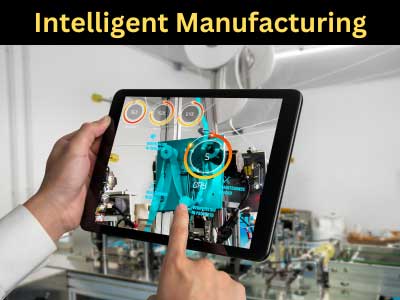What Is Meaning Intelligent Manufacturing?
Key Takeaway
Intelligent manufacturing, also known as smart manufacturing, uses advanced technologies like automation, data collection, AI, and machine learning to optimize production. These technologies work together to improve efficiency, increase productivity, and reduce costs.
By integrating human capabilities with machines and processes, intelligent manufacturing creates an adaptable and responsive production environment. Technologies like IoT and robotics enhance real-time decision-making, leading to better product quality and faster response to market demands.
Adopting intelligent manufacturing strategies helps companies stay competitive in a rapidly evolving industrial landscape. It ensures long-term sustainability and profitability through continuous improvement and innovation.
Definition of Intelligent Manufacturing
Intelligent manufacturing refers to the integration of advanced technologies and data-driven processes to enhance the efficiency, flexibility, and responsiveness of manufacturing operations. This approach utilizes cutting-edge technologies such as artificial intelligence (AI), machine learning (ML), the Internet of Things (IoT), and big data analytics to create a highly automated and intelligent production environment. The goal is to optimize every aspect of manufacturing, from design and production to supply chain management and maintenance.
In an intelligent manufacturing setup, machines and systems are interconnected, sharing data and insights in real-time. This interconnectedness allows for continuous monitoring and optimization of production processes, ensuring that operations run smoothly and efficiently. Intelligent manufacturing also involves the use of advanced robotics and automation to perform complex tasks with high precision, reducing the need for human intervention and minimizing errors.

Key Technologies
Several key technologies underpin intelligent manufacturing, each playing a crucial role in transforming traditional manufacturing processes into intelligent, data-driven operations.
Artificial Intelligence (AI) and Machine Learning (ML): These technologies enable machines to learn from data and improve their performance over time. AI algorithms can analyze vast amounts of data to identify patterns and make predictions, while ML models continuously adapt and refine their accuracy.
Internet of Things (IoT): IoT connects machines, sensors, and devices, allowing them to communicate and share data. This real-time data exchange provides valuable insights into machine performance, production rates, and environmental conditions, enabling proactive decision-making and optimization.
Big Data Analytics: By analyzing large datasets, manufacturers can uncover trends and insights that drive process improvements and innovation. Big data analytics helps in predictive maintenance, quality control, and supply chain optimization.
Advanced Robotics and Automation: These technologies enhance production efficiency and precision. Robots can perform repetitive and complex tasks with high accuracy, while automation systems streamline workflows and reduce manual intervention.
Benefits of Intelligent Manufacturing
Intelligent manufacturing offers numerous benefits that enhance the overall efficiency and competitiveness of manufacturing operations.
Increased Efficiency: By optimizing processes and reducing waste, intelligent manufacturing improves operational efficiency. Automated systems and real-time data monitoring ensure that production runs smoothly and resources are used effectively.
Enhanced Quality Control: Intelligent manufacturing systems continuously monitor production processes, identifying and addressing quality issues in real-time. This leads to higher product quality and reduces the risk of defects and recalls.
Cost Savings: Automation and predictive maintenance reduce labor and maintenance costs. By preventing equipment failures and minimizing downtime, intelligent manufacturing lowers overall operational costs.
Flexibility and Agility: Intelligent manufacturing systems are highly adaptable, allowing manufacturers to quickly respond to changing market demands and customer requirements. This flexibility is crucial in today’s fast-paced and competitive environment.
Improved Decision-Making: Data-driven insights enable manufacturers to make informed decisions quickly and accurately. Real-time data monitoring and advanced analytics provide a comprehensive view of operations, supporting strategic planning and optimization.
Implementation Strategies
Implementing intelligent manufacturing requires a strategic approach that involves several key steps.
Assessment and Planning: Begin by assessing current manufacturing processes and identifying areas for improvement. Develop a clear plan that outlines the goals, technologies, and resources needed for implementation.
Investment in Technology: Invest in the necessary technologies, such as IoT sensors, AI and ML software, advanced robotics, and big data analytics platforms. Ensure that these technologies are compatible and can be integrated seamlessly into existing systems.
Workforce Training: Train employees to work with new technologies and systems. Provide ongoing education and support to ensure that the workforce is skilled and confident in using intelligent manufacturing tools.
Data Management: Establish robust data management practices to collect, store, and analyze data effectively. Ensure data security and privacy, and use data analytics to drive continuous improvement and innovation.
Continuous Improvement: Implement a culture of continuous improvement, encouraging employees to identify opportunities for enhancement and innovation. Regularly review and refine processes to ensure that they remain efficient and effective.
Case Studies
Several companies have successfully implemented intelligent manufacturing, showcasing its potential to transform operations.
General Electric (GE): GE has embraced intelligent manufacturing by integrating IoT and AI technologies into its production processes. The company uses real-time data monitoring and predictive analytics to optimize equipment performance and reduce downtime. This approach has resulted in significant cost savings and improved efficiency.
Siemens: Siemens has developed the Siemens Digital Enterprise Suite, a comprehensive set of tools that enable intelligent manufacturing. The suite includes solutions for data integration, advanced analytics, and automation. Siemens has used these tools to enhance production efficiency, improve quality control, and reduce time-to-market.
BMW: BMW has implemented intelligent manufacturing in its factories, using advanced robotics and IoT technologies to streamline production. The company’s smart factories feature interconnected systems that provide real-time data on production status, enabling rapid adjustments and continuous optimization.
Conclusion
Intelligent manufacturing represents the future of industrial production, combining advanced technologies and data-driven processes to create highly efficient, flexible, and responsive operations. By leveraging AI, IoT, big data analytics, and advanced robotics, manufacturers can optimize every aspect of their production, from design and fabrication to supply chain management and maintenance.
The benefits of intelligent manufacturing are substantial, including increased efficiency, enhanced quality control, cost savings, flexibility, and improved decision-making. Implementing intelligent manufacturing requires careful planning, investment in technology, workforce training, effective data management, and a commitment to continuous improvement.
